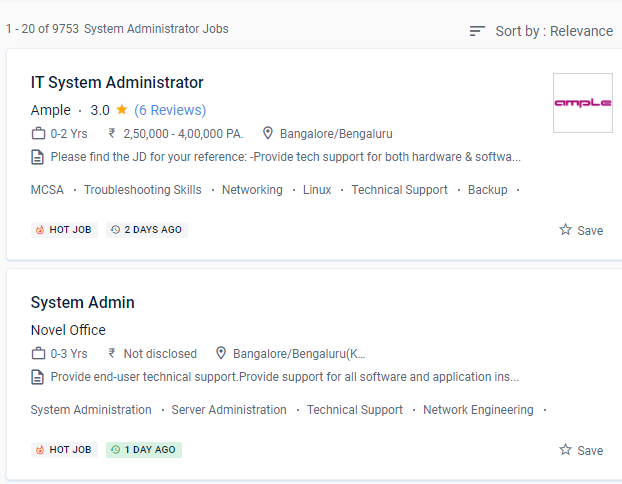System Administration Internship/Course Details


System administration roles are broad and often vary based on the type of computer system being managed, however, the majority of them have some fundamental functions that can be accomplished in a variety of ways.
A system administrator's responsibilities include the following:
System administrators are in charge of managing, maintaining, and configuring commercial computer systems on a day-to-day basis.
For secure, high-speed Internet access, they connect routers, modems, and firewalls. These experts may go on to become technology and IT managers in the future.
To digitally connect clusters of computers, they create local area networks (LANs) and wide-area networks (WANs).
They set up the network card (NIC) so that data can be sent and received appropriately. You'll also learn how to manage and configure servers, as well as how to manage PCs, user information, and user productivity using industry tools. We'll take a deep dive into the cloud, covering everything from common cloud infrastructure setups to cloud resource management.
All of the important components of the corporate computing infrastructure are managed by system administrators. You now understand what system administration entails, as well as the functions that system administrators execute and the talents that system administrators possess.






 System administration roles are broad and often vary based on the type of computer system being managed, however, the majority of them have some fundamental functions that can be accomplished in a variety of ways.
A system administrator's responsibilities include the following:
System administrators are in charge of managing, maintaining, and configuring commercial computer systems on a day-to-day basis.
For secure, high-speed Internet access, they connect routers, modems, and firewalls. These experts may go on to become technology and IT managers in the future.
To digitally connect clusters of computers, they create local area networks (LANs) and wide-area networks (WANs).
They set up the network card (NIC) so that data can be sent and received appropriately. You'll also learn how to manage and configure servers, as well as how to manage PCs, user information, and user productivity using industry tools. We'll take a deep dive into the cloud, covering everything from common cloud infrastructure setups to cloud resource management.
All of the important components of the corporate computing infrastructure are managed by system administrators. You now understand what system administration entails, as well as the functions that system administrators execute and the talents that system administrators possess.
System administration roles are broad and often vary based on the type of computer system being managed, however, the majority of them have some fundamental functions that can be accomplished in a variety of ways.
A system administrator's responsibilities include the following:
System administrators are in charge of managing, maintaining, and configuring commercial computer systems on a day-to-day basis.
For secure, high-speed Internet access, they connect routers, modems, and firewalls. These experts may go on to become technology and IT managers in the future.
To digitally connect clusters of computers, they create local area networks (LANs) and wide-area networks (WANs).
They set up the network card (NIC) so that data can be sent and received appropriately. You'll also learn how to manage and configure servers, as well as how to manage PCs, user information, and user productivity using industry tools. We'll take a deep dive into the cloud, covering everything from common cloud infrastructure setups to cloud resource management.
All of the important components of the corporate computing infrastructure are managed by system administrators. You now understand what system administration entails, as well as the functions that system administrators execute and the talents that system administrators possess.


















































































